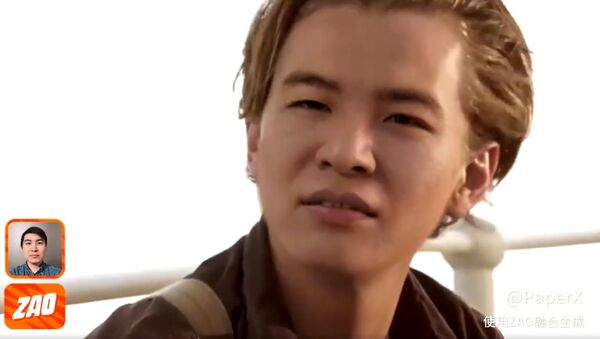Chinese mobile app publisher Momo’s lastest development, called ZAO, has gone viral in the country, allowing Chinese residents to become "Hollywood stars" in their favourite movies and TV shows. The app can replace an actor's face with that of a user using a single selfie photo, though only in a number of selected fragments from popular motion pictures.
One user inserted himself in the roles played by Leonardo DiCaprio, noting that such technology could possibly be utilized by streaming giants in the future to increase user engagement in content, as well as increase "Asian representation in Hollywood".
In case you haven't heard, #ZAO is a Chinese app which completely blew up since Friday. Best application of 'Deepfake'-style AI facial replacement I've ever seen.
— Allan Xia (@AllanXia) September 1, 2019
Here's an example of me as DiCaprio (generated in under 8 secs from that one photo in the thumbnail) 🤯 pic.twitter.com/1RpnJJ3wgT
Here’s for Asian representation in Hollywood 😂 #ZAO #AI #Deepfake pic.twitter.com/qrSs3VajfL
— Allan Xia (@AllanXia) September 1, 2019
ZAO's success has been clouded by privacy concerns raised by the website RADII, which pointed out that the company reserves its rights to any user-generated content in its terms of service, but Momo later amended them allowing individuals to opt-out of their videos being used without their consent.
Still, this hasn't alleviated netizens concerns, especially concerning ZAO being developed by a Chinese company and thus its data could end up in the hands of the government, in line with so far unfounded accusations of alleged espionage against its own citizens.
What could POSSIBLY go wrong in the hands of a Communist, Social Credit - population stalking - micro-aggression - social coercion obsessed - authoritarian government?#china #hongkong #auspol #socialcredit
— Alexandra Marshall (@ellymelly) September 2, 2019
Meanwhile China builds the most comprehensive facial scan database on the planet.
— Frank Diaz (@realityengine) September 1, 2019
One Twitterian noted that a user's data, namely photos, are already mostly available online for free since many netizens freely post selfies on social media platforms en masse.
To be honest, every single platform out there that allows users to post selfies can already do that. The problem is that people will never stop posting selfies.
— Allan Xia (@AllanXia) September 1, 2019
Others pointed out that ZAO's success in creating credible looking fakes only adds to the fears that the technology could be used to fabricate evidence in criminal cases and scandals.
The converse is also scary: Criminals creating reasonable doubt by claiming they've been deepfaked into footage...
— T.J. Crowder (@tjcrowder) September 1, 2019
That’s insane ... the world won’t ever know what’s real from now on 🤷♂️
— leveller (@levellerNet) September 1, 2019
Some Twitterians were left with mixed emotions about the technology, since it is as exciting as its potential for misuse is scary.
The future. 😂
— Allan Xia (@AllanXia) September 1, 2019
Wtf this is cool and disturbing
— Hank Hill (@Lakers714) September 1, 2019
Deepfake neural network technology’s capabilities have earlier faced criticism over other aspects of its applications. Namely, similar technology was used by an app called DeepNude that could "undress" any woman in a photo and the DeepFake app being used to create porno clips "featuring" Hollywood stars and other famous personalities.


